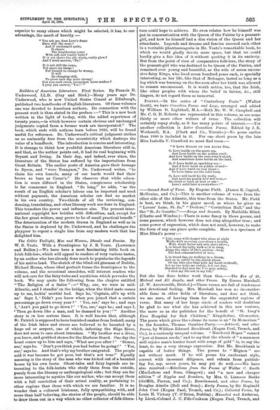Builders of American Literature. First Series. By Francis H. Underwood,
LL.D. (Gay and Bird.)—Many years ago Dr. Underwood, who is now United States Consul at Edinburgh, published two handbooks of English literature. Of these volumes one was devoted to American authors. Its connection with the present work is thus stated in the preface :—" This is a new book written in the light of to-day, with the added experience of twenty years,—in which however certain obvious and unchanged judgments copied from a former work are incorporated." The book, which ends with authors born before 1826, will be found useful for reference. Dr. Underwood's critical judgment strikes us as eminently free from the eccentricity which destroys the value of a handbook. The introduction is concise and interesting. It is strange to think how youthful American literature still is, and that, as the author points out, it had its real beginning with Bryant and Irving. In their day, and indeed, ever since, the literature of the States has suffered by the importations from Great Britain. The earlier poets of America gave their homage to Byron, and "were Tennyson," Dr. Underwood writes, "to claim his own laurels, many of our bards would find their brows as bare as Ctesar's." He observes that while educa- tion is more diffused in the States, conspicuous scholarship is far commoner in England. " So long," he adds, " as the result of an English scholar's labour can be imported and used without payment, the American scholar can find no market in his own country. Two-thirds of all the reviewing, con- densing, translating, and other literary work are done in England. This transfers the power and influence also. The present inter- national copyright law bristles with difficulties, and, except for the few great writers, may prove to be of small practical benefit." The deterioration of the modern drama in England as well as in the States is deplored by Dr. Underwood, and he challenges the playgoer to repeat a single line from any modern work that has delighted him.


















































 Previous page
Previous page